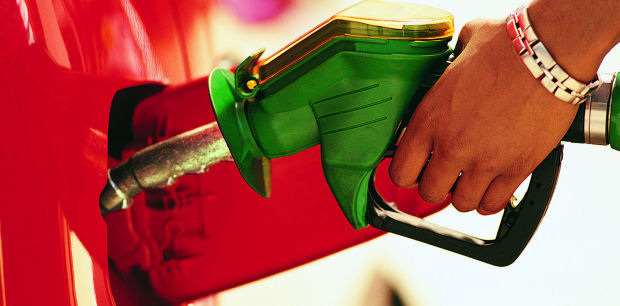Cash-strapped drivers cut petrol use by 15 per cent
Drivers stung by high fuel prices have cut petrol use by 15 per cent since the credit crunch hit, new figures show. The AA tells Channel 4 News it is a welcome environmental boost – but at a price.

Between January and June this year, government figures show that 1.7bn fewer litres of petrol and diesel were sold at UK petrol stations than in the first half of 2008 – before the credit crunch.
The AA said that the drop in sales was down to rising fuel prices. It said that the decline had deprived the Treasury of almost £1bn in fuel duty over the first six months of this year.
AA President Edmund King said: “There is no downplaying the impact of record fuel prices on family’s and other people’s lives. A 1.7bn litre drop in petrol sales says just one thing – too many car owners cannot afford these record prices.”
Petrol prices in the first six months of the year averaged 133.13p a litre, up 16.45p on the same period last year and 24.13p higher than in 2008. In May this year, an AA survey showed that 76 per cent of its members were cutting back on car use, other spending, or both.
Where can you get the UK's cheapest petrol?
The fall in petrol consumption was down to both individuals and businesses tightening their belts, an AA spokesman told Channel 4 News.
“There’s a dual hit: consumer spend on the high street is being siphoned into pump sales and higher prices are pushing up the cost of transport. So for businesses there’s not only the consequences of consumers spending less but also higher costs.”
There is no downplaying the impact of record fuel prices on family’s and other people’s lives. AA President Edmund King
A spokesman for the UK Petroleum Industry Association added: “It’s fair to say demand is going down. But that’s as much down to the recession as anything. It’s difficult to separate if it is linked to higher prices or duty, and how much it is to with the generally lacklustre economy.”
Silver lining?
On the plus side, the fall in petrol sales has also saved almost 4m tonnes of CO2 – equivalent to the amount absorbed by nearly 0.5 per cent of the UK’s broadleaf trees over their lifetime.
Friends of the Earth Transport Campaigner Richard Dyer told Channel 4 News that the price rises were tough on consumers, but the benefits for the environment were positive.
“As a result of higher petrol prices, more car sharing, more walking and cycling, is going on. People are changing their habits which is good for the environment,” he said.

However Mr Dyer said the government had more of a role to play.
“We do need to change how we travel and the government should do more to help that by making it easier for people to choose other options – better public transport, better conditions for walking and cycling, promoting car sharing.”
Why so expensive?
The AA’s fuel prices expert Luke Bosdet told Channel 4 News that the cut in petrol use was down to “pure survival” for motorists.
“It’s a welcome by-product that it is reducing CO2 but it comes at a price – a youngster starting out in their first job trying to travel to work and finding it is too expensive and he can’t get there – if you turned around and said that was benefiting the environment, you’re going to get two fingers,” he said.
Fuel price rise pits motorists against the government
Petrol prices have jumped this year due to leaps in oil prices, fuelled by global economic turmoil as well as political uncertainty in oil-producing nations during the Arab Spring, alongside fuel duty burdens depite George Osborne’s 1p a litre sop to motorists in the Budget earlier this year.
While the link is acknowledged, it remains unclear in the UK how the price of turning oil into petrol matches up with the charges at the pumps. A UK Petrol Industry Association spokesman told Channel 4 News that the government indices of what crude oil input costs for UK refineries showed it was more expensive now than when oil reached an all-time high in 2008 – even though oil prices in the US are falling.
The AA says that unless the cost of making oil into petrol is made clearer, the situation will remaing confusing.
“It would be useful to know at what prices an oil refinery can produce petrol and still make a healthy profit without going mad. It’s a balance between keeping the consumer happy and not turning our refinery business into a sunset industry. Transparency is important,” said Mr Bosdet.